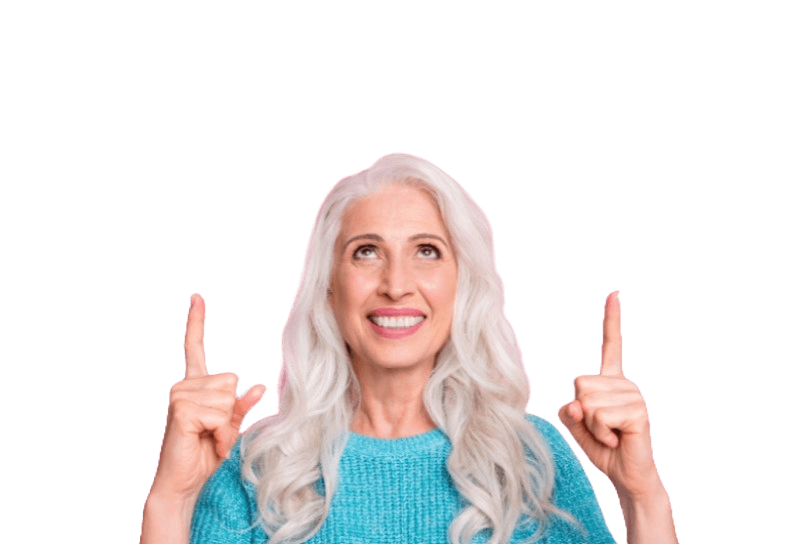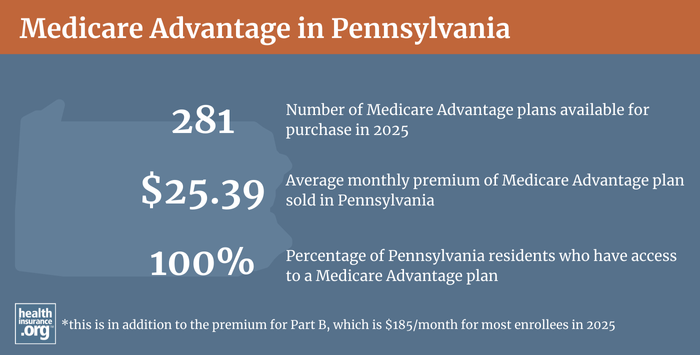Medicare in Pennsylvania

Pennsylvania’s Medicare Advantage market is robust, with 50+ plans available in most counties
Key takeaways
- Medicare covers more than 2.9 million Pennsylvania residents.1
- Pennsylvania has among the most robust Medicare Advantage markets in the country; most counties have at least 50 Medicare Advantage plans available.2
- 53% of Pennsylvania beneficiaries have coverage under Medicare Advantage plans (instead of Original Medicare).1
- Insurers offer 16 stand-alone Part D prescription drug plans in Pennsylvania in 2025, with premiums starting at $0 a month.3

Pennsylvania Medicare enrollment
As of September 2024, there were 2,951,112 Pennsylvania residents enrolled in Medicare.1 That’s 20% of the state’s population, versus about 18% of all U.S. residents enrolled in Medicare.4 Pennsylvania has the fifth-highest percentage of residents who are age 65 or older, so it makes sense that the state has a higher-than-average percentage of residents enrolled in Medicare.
For most Americans, eligibility for Medicare benefits is tied to turning 65. But Medicare eligibility is also triggered when a person has been receiving disability benefits for at least two years (people with ALS or end-stage renal disease do not have to wait two years for their Medicare enrollment to begin).
As of late 2024, nearly 11% of Pennsylvania’s Medicare beneficiaries were under 65 and eligible for Medicare due to a disability (as opposed to being eligible due to their age).1
Medicare options
Beneficiaries have various choices when it comes to how they access their Medicare benefits and whether they add supplemental coverage. The first choice is between Medicare Advantage plans, where coverage is administered by private insurers, or Original Medicare, where claims are paid directly by the federal government. Medicare beneficiaries also have options around Medigap policies and Medicare Part D (prescription drug) coverage.
Original Medicare includes Part A (also called hospital insurance, which helps pay for inpatient stays, like at a hospital or skilled nursing facility, along with hospice benefits) and Part B (also called medical insurance, which helps pay for outpatient care like a doctor appointment or a preventive healthcare service, such as most vaccinations). Medicare Advantage plans bundle Parts A and B under a single monthly premium and often include other services like prescription drug and vision coverage. There are pros and cons to either option, and the “right” solution is different for each individual.
Learn about Medicare plan options in Pennsylvania by contacting a licensed agent.



Explore our other comprehensive guides to coverage in Pennsylvania

We’ve created this guide to help you understand the Pennsylvania health insurance options available to you and your family, and to help you select the coverage that will best fit your needs and budget.
Learn about health insurance coverage options in Pennsylvania.


Hoping to improve your smile? Dental insurance may be a smart addition to your health coverage. Our guide explores dental coverage options in Pennsylvania.


Learn about Pennsylvania’s Medicaid expansion, the state’s Medicaid enrollment and Medicaid eligibility.


Short-term health plans provide temporary health insurance for consumers who may find themselves without comprehensive coverage. Learn more about short-term plan availability in Pennsylvania.
Learn about short-term insurance regulations in Pennsylvania.

Frequently asked questions about Medicare in Pennsylvania
What is Medicare Advantage?
In Pennsylvania in 2018, 40% of Medicare beneficiaries were enrolled in Medicare Advantage plans (at that point, nationwide Medicare Advantage enrollment covered 34% of Medicare beneficiaries). But by September 2024, private Medicare coverage enrollment had grown to 53% of Pennsylvania’s Medicare population.1
Pennsylvania stands out as having among the most robust Medicare Advantage markets in the country. Plan availability varies by county, but every county in Pennsylvania has at least 35 Advantage plans available in 2025, and most have more than 60.2
Medicare beneficiaries can switch between Medicare Advantage and Original Medicare during the annual election period in the fall, which runs from October 15 to December 7 each year, with coverage effective January 1. There is also a Medicare Advantage open enrollment period in the first quarter of the year (January 1 to March 31) during which people who are already enrolled in Medicare Advantage plans can change to a new Medicare Advantage plan or drop their Medicare Advantage plan and enroll in Original Medicare instead.

What is Medigap?
Original Medicare has out-of-pocket costs that can be substantial and there is no out-of-pocket cap with Original Medicare. Many Original Medicare beneficiaries use Medigap plans to supplement their coverage, with the Medigap plan covering some or all of the out-of-pocket costs (for coinsurance and deductibles) that they would otherwise have to pay themselves.
There are 52 insurers that offer individual Medigap plans in Pennsylvania as of 2025.5 According to data compiled by AHIP, 694,691 Pennsylvania residents had Medigap coverage as of 2022.6
Medigap plans are standardized under federal rules, with ten different plan designs (differentiated by letters, A through N), but premiums vary significantly from one insurer to another. Federal rules provide a six-month guaranteed-issue window for Medigap plans, which begins when the person is at least 65 and enrolled in Medicare Part B.
There’s no federally-guaranteed access to Medigap plans for people under the age of 65 who are eligible for Medicare due to a disability, but Pennsylvania is among the majority of the states that have rules ensuring at least some access to Medigap plans for enrollees who are under the age of 65. In Pennsylvania, the six-month open enrollment window for Medigap plans starts when you’re enrolled in Part B, and it applies regardless of age. Pennsylvania state law regarding Medigap plans (Chapter 89, Subchapter K) is available here.
Pennsylvania statute (Title 31, § 89.778) prohibits Medigap insurers from charging higher premiums based on medical history when a person enrolls during their initial six-month enrollment window, so premiums cannot be higher for disabled enrollees (in many states, Medigap coverage is guaranteed-issue for beneficiaries under 65, but premium can be higher; Pennsylvania does not allow this).
What is Medicare Part D?
Original Medicare provides fairly comprehensive coverage, but it does not pay for outpatient prescription drugs. Some Medicare beneficiaries have supplemental prescription coverage as part of an employer-sponsored plan, including retiree plans. If that’s not an option, an individual can get needed coverage for medications by enrolling in a stand-alone Medicare Part D plan or a Medicare Advantage plan that includes Medicare Part D coverage for prescription drugs.
In 2025, there are 16 stand-alone Medicare Part D plans for sale in Pennsylvania, with monthly premiums that start at $0.7
As of September 2024, there were 1,061,924 beneficiaries of Medicare in Pennsylvania with stand-alone Part D coverage, and another 1,406,285 had Part D coverage integrated with Medicare Advantage plans.1 Total Medicare enrollment and total Medicare Part D enrollment have been increasing in Pennsylvania and nationwide as the Baby Boomer population ages into Medicare. But enrollment in stand-alone Medicare Part D plans has been decreasing in Pennsylvania, while enrollment in Medicare Advantage plans (most of which include Part D coverage) has been increasing rapidly.
Medicare Part D enrollment (for stand-alone plans as well as Medicare Advantage plans with integrated Part D coverage) is available during the annual election period, from October 15 to December 7 each year. Plan changes made during this window will take effect the following January 1.

How does Medicaid provide financial assistance to Medicare beneficiaries in Pennsylvania?
Many Medicare beneficiaries receive financial assistance through Medicaid with the cost of Medicare premiums and services Medicare doesn’t cover – such as long-term care.
Our guide to financial assistance for Medicare enrollees in Pennsylvania includes overviews of these benefits, including Medicare Savings Programs, long-term care coverage, and eligibility guidelines for assistance.
What additional resources are available for Medicare beneficiaries and their caregivers in Pennsylvania?
Do you have questions about Medicare eligibility in Pennsylvania? Do you need help understanding your options or getting signed up for Medicare coverage? See the below list of free resources to help you access and manage your Medicare coverage.
- You can contact APPRISE, Pennsylvania’s State Health Insurance Assistance Program (SHIP), with questions related to Medicare coverage in Pennsylvania. Visit the APPRISE website or call 1-800-783-7067.
- For Medicare beneficiaries with limited income and assets, Pennsylvania Medicaid might be available to help make coverage and care more affordable. You can contact the Pennsylvania Department of Human Services website for more information or call 1-866-550-4355.
- Medicare coverage is regulated by both federal and stage agencies, depending on the type of coverage. The Pennsylvania Insurance Department regulates Medigap plans in the state as well as brokers and agents who sell Medicare coverage, and is a great resource for Pennsylvania residents.
- Visit the Medicare Rights Center. This website provides helpful information geared to Medicare beneficiaries, caregivers, and professionals.
Louise Norris is an individual health insurance broker who has been writing about health insurance and health reform since 2006. She has written dozens of opinions and educational pieces about the Affordable Care Act for healthinsurance.org.

Looking for more information about other options in your state?
Need help navigating health insurance options in Pennsylvania?
Explore more resources for options in Pennsylvania including ACA coverage, short-term health insurance, dental insurance and Medicaid.
Speak to a sales agent at a licensed insurance agency.
Footnotes
- “Medicare Monthly Enrollment – Pennsylvania.” Centers for Medicare & Medicaid Services Data. Accessed January, 2025. ⤶ ⤶ ⤶ ⤶ ⤶ ⤶
- ”Medicare Advantage 2025 Spotlight: First Look” KFF.org Nov. 15, 2024 ⤶ ⤶
- ”Fact Sheet: Medicare Open Enrollment for 2025” (16) Centers for Medicare & Medicaid Services. Sep. 27, 2024 ⤶
- U.S. Census Bureau Quick Facts: United States & Pennsylvania.” U.S. Census Bureau, July 2024. ⤶
- “Explore your Medicare coverage options.” Medicare.gov. Accessed October, 2024. ⤶
- ”The State of Medicare Supplement Coverage” AHIP. May 2024 ⤶
- ”Fact Sheet: Medicare Open Enrollment for 2025” (116) Centers for Medicare & Medicaid Services. Sep. 27, 2024 ⤶

